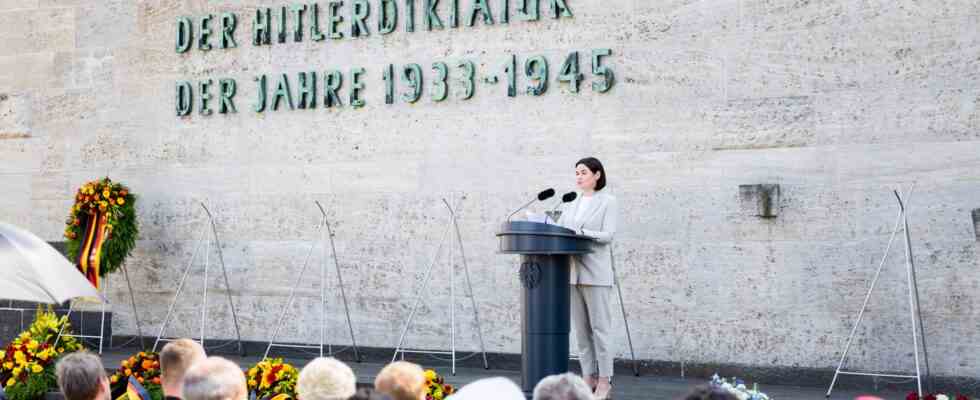As of: 07/20/2022 7:05 p.m
On the 78th anniversary of the attempted assassination attempt on Hitler, the speakers recalled the courage of the women and men involved. Dictatorships thrive when democracies aren’t careful, warned Belarusian opposition figure Tichanovskaya.
On the 78th anniversary of the failed assassination attempt on Adolf Hitler, the Federal Government and the Berlin Senate paid tribute to the resistance movement against National Socialism.
On July 20, 1944, a bomb attack by the officers around Claus Schenk Graf von Stauffenberg failed. Around 200 accomplices and relatives were then executed.
Scholz admires courage
“78 years ago today, the men and women around Colonel Stauffenberg risked their lives to overthrow Hitler’s regime,” Chancellor Olaf Scholz wrote on Twitter.
“I admire their courage and that of all those who opposed the Nazis. Their sacrifice obliges us to always stand up for democracy,” said the SPD politician.
Habeck sees “blind spot”
In the welcome speech at the ceremony in the Plötzensee memorial, Vice Chancellor and Federal Minister of Economics Robert Habeck called for a stronger focus on the Eastern European countries. The speech was read by State Secretary Anja Hajduk because the Green politician is still in corona isolation.
According to Habeck, there is a “blind spot” in Germany: “The insufficient reminder that it was above all the people in Poland, Belarus, Ukraine, the Baltic States and the western regions of Russia who fell under the National Socialist dictatorship and policy of annihilation have suffered.”
Tichanovskaya: Parallels between Hitler and Lukashenko
The federal government should remain unyielding to Russia’s President Vladimir Putin, said the Belarusian opposition politician Svetlana Tichanovskaya. She was the keynote speaker at the ceremony.
“Dictatorships thrive when democracies aren’t careful,” said Tichanovskaya, referring to the British policy of making far-reaching concessions to Hitler in order to keep the peace.
The opposition politician drew parallels between the resistance against Hitler and the resistance in her authoritarian home country against the ruler Alexander Lukashenko. Belarus has become a prison, she explained. Tichanovskaya’s husband has been in solitary confinement for two years. He is a political prisoner like over 1,000 others. Tichanovskaya draws strength from the memory of resistance, of fighting back against dictatorships: “Civil courage is timeless and knows no bounds.”
Lederer: Vulnerable Democracy
Berlin Mayor Franziska Giffey, like Habeck, was unable to attend the ceremony due to a corona infection and was represented by Culture Senator Klaus Lederer.
The left-wing politician recalled that 89 women and men were “victims of the criminal Nazi judiciary” on July 20 at Plötzensee. Almost 3,000 people were executed in the former execution site between 1933 and 1945.
“The task for all of us to take responsibility for our democracy is one of the enduring lessons from the Nazi dictatorship,” said Lederer. He pointed out how vulnerable democracy is.
Bas: Right to disobey orders
At the ceremonial pledge of 400 recruits in Berlin, Bundestag President Bärbel Bas pointed out that soldiers of the Bundeswehr have a right to refuse illegal orders.
“Obedience ends where there is injustice, where orders come from a recognizably criminal regime,” said the SPD politician. “The Basic Law provides for a right of resistance against anyone who undertakes to abolish the constitutional order in Germany.”
With information from Barbara Kostolnik, ARD capital studio

